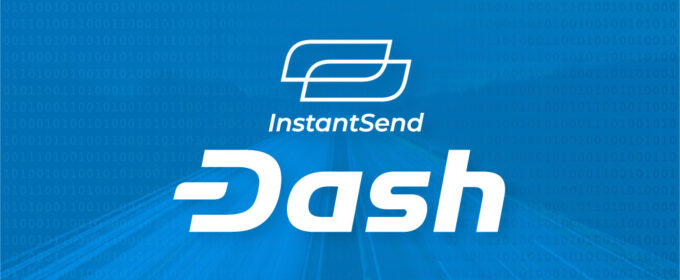 16 Febbraio, 2022 5:31 pm
16 Febbraio, 2022 5:31 pm
What Is Dash InstantSend (and How Does It Work)?
The modern economy operates at the speed of “now.”
In this brave new (digital) world, everything must operate fast enough to satisfy user demand and expectations. While cryptocurrencies have unlocked revolutionary payment potential, the vast majority of cryptocurrencies still lack the immediacy that cash and credit payments can offer. As a result, these limitations have stood in the way of cryptocurrencies getting mass-adopted in practical, real-life situations. They simply take too long, often requiring up to 90 minutes to complete a transaction. On-chain transactions for most cryptocurrencies can take time that is impractical for in-person payments. By design, these can be reversed or redirected until the transaction is confirmed in a block. Imagine picking up your morning coffee and bagel, paying with crypto, then asking the cashier to wait for multiple block confirmations. For crypto to successfully permeate everyday transactions, speed is key.

With Dash InstantSend, settlement times can be reduced to under two seconds. This provides the dual convenience of cash and credit transactions with an unprecedented level of security unique to crypto. Because of its incredible speed, Dash is one of the most successful cryptocurrencies at facilitating in-store purchases. In fact, Dash has roughly seven times as many in-store merchant locations as its much larger cousin Bitcoin — because it’s reliable, safe, and yes, fast. These faster speeds come without any compromises made to security.
Thus, for merchants and consumers alike, Dash InstantSend delivers the very best of both worlds. But how does Dash InstantSend actually work? What’s the underlying technology that enables the process? Most importantly, how does it achieve all this while maintaining security?
In this brief article, we’ll explore the many practical benefits of Dash’s InstantSend and discuss the technical components that help generate this powerful system.
Dash InstantSend: Explained
Dash InstantSend enables users to complete payments in the blink of an eye. Powered by a group of masternodes (another notable Dash advancement), InstantSend elevates Dash out of the niche crypto realm and into the real world at mainstream companies like Subway, Lowe’s, and Staples.
With Dash’s InstantSend, transaction confirmations are effortlessly streamlined so beneficiaries can rapidly and reliably confirm receipt of the funds.
By contrast, most cryptocurrencies operate at an exponentially slower pace. Bitcoin, for example, requires an average of ten minutes to confirm transactions. During times of congestion on the network, confirmation times can be much longer. Slower speeds have deterred merchants and consumers from including cryptocurrencies in their businesses and wallets.
And while InstantSend technology provides transaction systems that rival those of major debit and credit cards, it does so without relying on a centralized authority. This empowers merchants through every step of the sale, helps business owners stay in command of their accounting processes, and protects businesses from the ravages of chargeback fraud (which contributed to over $17.5 billion in corporate losses in 2020 alone). Ultimately, Dash InstantSend combines speed and security with unprecedented success.
How Dash InstantSend Works
From a high level perspective, Dash InstantSend facilitates transactions at imperceptibly fast speeds.
The corporate world has quickly affirmed the value of Dash InstantSend, and in just a few short years, it has been adopted at over 155,000 merchant in-store locations and more than 125 online retailers across the United States.
While merchants, exchanges, and payment processors rely on InstantSend’s simplicity, the mechanisms that power it are quite complex. To understand how InstantSend works on the Dash network, there are two key components to consider: Transaction Locking and Masternode Locking Authority.
Transaction Locking
As the first element of InstantSend, transaction locking was built to prevent “double-spending” within the Dash network.
A double-spend occurs when one unit of a given cryptocurrency is fraudulently used a second time. It can be looked at as a digital form of stealing. While such theft requires considerable levels of criminal manipulation and forgery, it nevertheless remains a constant threat to digital currencies.
Although most cryptocurrencies do make an effort to defend against double-spending, their resulting security measures slow transaction confirmation speeds to a crawl. The most common approach is to wait for several blocks of transactions to be published before a recipient can safely consider a transaction final. This effectively renders most cryptocurrencies ineffective for real-time transactions.

Transaction locking, therefore, is the primary Dash firewall against double-spending and slow transaction speeds. While sustaining the highest level of security measures, transaction locking eliminates the sluggish wait times experienced by the vast majority of competing cryptocurrencies.
But how does transaction locking actually work?
Let’s say a Dash user initiates a transaction, and sends it to the network. From a computational standpoint, the client has technically declared their intent to “lock” funds from one defined input to another defined output. As this declaration relays across the network, it quickly reaches the masternodes.
At the time any transaction is sent, the Dash network algorithmically agrees on a subset of masternodes, called a quorum, to reach consensus over the validity of the transaction. The quorum is effectively delegated authority to validate the transaction and report back to the network if the quorum agrees that the transaction is valid. The “masternode locking authority” that results effectively means the entire network can honor the resulting outcome and align on the validity of each transaction.
Masternode Locking Authority
With “masternode locking authority,” the individual masternodes vote to confirm the validity of the user’s transaction. During the approval process, consensus is only considered to be reached when the required 60% of the quorum validates the given transaction. This 60% supermajority ensures that the network is in strong agreement before an InstantSend lock can be issued.
Despite the fact that the use of quorums is an additional step in the process, the transaction is still completed instantaneously. More importantly, it also provides a second layer of protection to all InstantSend transactions.
When consensus is finally reached, the transaction will then be considered locked. A special message cryptographically signed from the quorum is propagated to the network, signaling the masternode quorum’s consensus that the transaction is final.
Though this highly technical process takes time to describe (and perhaps longer to understand), it only takes a single second to complete. That’s the beauty of Dash’s InstantSend technology.
To review the process, consider this brief example:
- John makes a purchase at an online store.
- He sends 10 DASH to complete the purchase.
- John’s transaction is broadcast across the network and reaches a masternode quorum.
- The masternodes vote on the validity of the transaction and reach a consensus. When consensus is reached, the message from the masternodes that indicates the transaction is locked propagates across the network.
- John completes the purchase and gains ownership of his requested goods/services, while the merchant receives the appropriate compensation.
While this is a simplified explanation, the computational complexities of InstantSend can be further explored at your convenience.
Click here to check out a granular, hands-on guide to the underpinning technology of Dash InstantSend.
Getting Started
As countless merchants and consumers will attest, Dash’s InstantSend is truly the future of payments. While combining the hallmark features of both cash and crypto, Dash’s InstantSend gives users the opportunity to complete transactions in a safe, reliable, and incredibly fast manner.
For more information, be sure to check out the library of resources available on the Dash blog.